"What the hell do you do?"
An intro to Entrepreneurial Gym
Introduction
In the last few years, I've been very intentional about talking with people that are having an impact on the world, specifically in the Education realm, the one where I'm more active.
If you count my first guitar classes, I've been working in Education for more than 7 years. First as a music teacher, then as a corporate trainer in soft skills, then as a coach, a designer of learning experiences and finally as a Pedagogical Coordinator.
These days, I spent most of my "personal pitch" talking about my current job at Ginásio do Empreendedor (in English: Entrepreneurial Gym). Throughout this essay, I'll refer to the project using the Portuguese abbreviation: GE.
When talking about this with other people, I've never had an article or website I could send my international friends to, in order to better understand the project. So, I took matters into my own hands and decided to write an essay about it, serving as my "recommended reading" whenever people want to know more about GE.
So, let's begin with some background story.
How was GE born?
We're the biggest project in a small non-profit called A4. Their mission is to eradicate the waste of young talent, first in our hometown, Alcobaça, and then at a national level.
GE was the first project that actually allowed to scale that positive impact and it started with a mandatory subject in most Portuguese middle schools: citizenship.
From 7th to 9th grade, students have this subject dedicated to social issues, with the goal of making them more active citizens.
Unfortunately, this happens mostly in theory.
Due to the amount of work and bureaucracy on other subjects, teachers barely have the time to think about this particular class and it ends up being underutilized. Students spend between 45 and 90 minutes discussing small issues about their class more than anything else. Who's been misbehaving, skipping class, etc.
Is this important? Sure. Is there a better use for talented kids? Yes.
Instead of learning about all the social changes happening in the world and in their communities, kids end up questioning the utility of such subject. It was with that problem in mind that Franscisco Serralheiro, our founder, came up with the concept that would then become GE.
He talked with the teachers and offer to replace them every two weeks, implementing an entrepreneurship program where students would become aware of social entrepreneurship and would create meaningful projects that would have a positive impact on their schools or cities.
He was able to get a few teachers on board and worked with a bunch of students on the first edition of the project. Even though this happened during Covid and things weren't optimal in that sense, he decided the idea was good enough to pursue in a more professional way.
As the next school year approached, he had a meeting with me, a few months after I closed my own non-profit.
Alcobaça is a small town so, people building projects usually know each other, so when he reached out I was already expecting some kind of brainstorming around GE. Francisco made me a pitch about the project and challenged me to do something very specific: create a pedagogical model that would allow for the project to scale.
It was a crazy challenge since he had nothing prepared except for his general concept and I had to do it in 2 months. Which I did.
However, when I presented the model to Francisco, he realized he needed someone to actually implement its different layers and hired me as a Pedagogical Coordinator.
In a year, we went from "students are building projects" to "students are changing their schools and communities".
So, it's time to tell you how we do it.
How does GE work?
We're very lucky to start with great source material, a class with students earning for something different than the typical citizenship class.
We double down on that idea so we can keep students motivated.
The first thing we do is to set them up in teams. Throughout this experiment, they'll undergo some challenges and being able to rely on others is a big part of what makes this possible. Besides, it allows them to consolidate friendships, create new ones and develop their overall social skills.
Once we have the different teams ready to go, we start by giving them the basis of Social Entrepreneurship, with a special focus on INE Problems.
These are social problems that are Important, Neglected and with Externalities (meaning, the negative impact of it transcends the people directly involved).
Once they understand this, the next challenge is to go look for them in 2 different contexts: their school or their communities.
Sometimes, we ask them to enumerate big, social problems with a global impact (such as inequality or racism) and try to understand how those manifest in their own lives and contexts. That allows for the development of the "problem-locating" muscle.
Each team ends up with a list of problems they want to solve and picks one to start.
Then we introduce the idea of the Minimal Viable Project, a solution that's possible to be tested and implemented in the amount of time we're working with them (it ranges from 3 to 7 months), guaranteeing they have some positive impact on the problem they picked.
Once they have a vision, they start working on it (in class and, sometimes, at home), executing different tasks that make the project come to life.
They may want to organize a concert in order to raise money to buy solar panels for children living in poverty (it happened). Other times, they may want to sell used pottery in order to raise money and buy some school materials (it happened as well).
Our focus is not so much on a business idea (even though we had one and he even made money out of it) but to go through 2 transformative experiences:
- Building something and learning with it;
- Understanding the difference they can make in their community.
That's the most important thing to us.
However, we know that students need something more other than transformative experiences to remain motivated (especially if they're getting started) so, we built an extra incentive system.
I mentioned that teams execute tasks that allow for the project to grow. Well, each one of these tasks is registered by the teams in a Notion platform we've created and is evaluated by the mentors. They can earn up to 3 points depending on the impact of the task and how clearly it’s stated.
The points then add up to a team score that allows them to compete in the Entrepreneurial Gym League, where the 7 first places get to present their projects in a pitch to a jury that then ranks them. By the end of it, they can earn different prizes based on their qualification on the table.
This increases their motivation to build things, and we use that resolve to help them develop skills related to building projects, leadership, working in teams, emotional intelligence, among others.
Last year, we worked with more than 300 students, building 36 different projects. This year we're planning to increase both of those metrics.
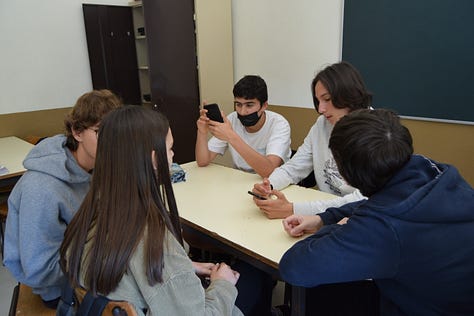
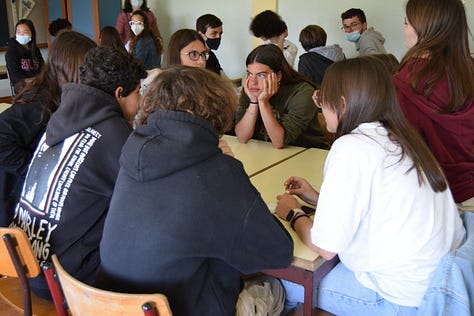
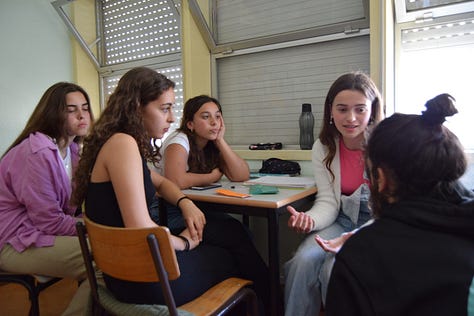
This is what we do, but a question that may arise is: who's actually going to the schools and helping students on a weekly basis?
Well, we don't have teachers, coaches, or professional facilitators on our team.
We do something far more interesting.
Who are these mentors?
Students!
You read that right.
Our mentors, the ones going to classes and teaching all of these things are students trained by us to become the "ultimate mentors".
Last year we had college students, wanting to develop some skills and add some meaningful experiences to their curriculum. This year, we're aiming at something even more ambitious and impactful: transforming high schoolers into mentors.
I truly believe high schoolers are the key to a Modern Golden Age and being able to prove it by seeing these young boys and girls becoming mentors and leading different teams has been so rewarding...
We have them work with students from the 7th to 9th grade and they've been impressing anyone with their results.
But you may wonder: how does a high schooler know how to take care of a class and actually play the role of the mentor?
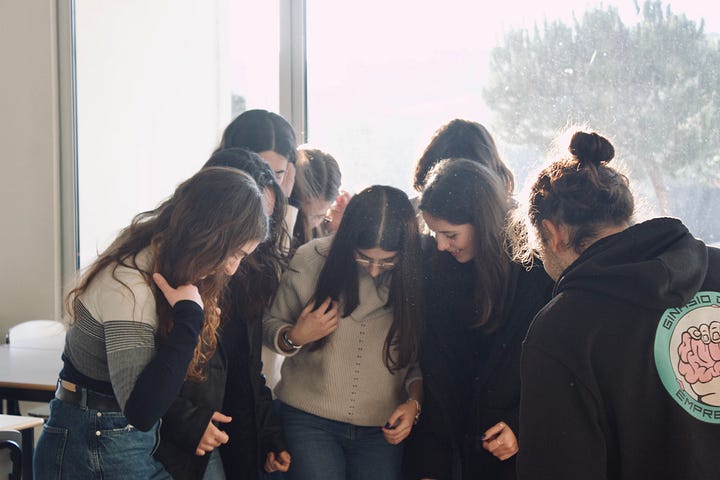
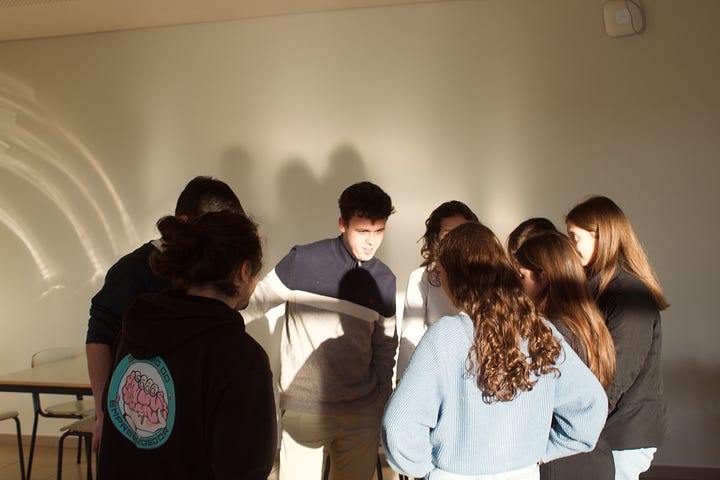
Well, that's where I come in.
What's my role in this?
Not to toot my own horn but I've built a great pedagogical model.
It has 3 different layers: one focused on the student, another on the learning experience and the final one on the mentor itself.
After going through the recruitment process (we look for students with high levels of proactivity or some experience in volunteering) the mentors get as much coaching as the students.
They have 2 different kinds of training.
The first one is a bootcamp where we teach them the basics of facilitating a great learning experience.
I've been doing it for years, across a multitude of contexts and students. I know how to set up a workshop or a class that actually has an impact on the students so I teach them the basics of that.
Then, once they start actually going to classrooms, we have "capacitation sessions". Every week, I meet with these mentors online and we go through each team that they're mentoring, understanding the different challenges and helping them with different strategies and techniques that allow for solutions.
That way they get personalized feedback on how to deal with certain issues, grow as individuals and professionals and build confidence in themselves as time passes.
The first time, I may go to a class, just to serve as "emergency support" if needed but then, I remove myself from the "in-person" equation and just with the capacitation sessions, they become ready to transform those younger students.
What’s our mission?
Francisco has a vision I admire: turn entrepreneurship into a sport that kids can play.
I love that! However, personally, I think about it in a different way.
My biggest goal is for these students (both mentors and mentees) to realize they actually have the power, the agency, to make decisions that increase their quality of life but also have an impact on others, helping everyone grow in this situation. I've designed the pedagogical model with that in mind and it's an honor and a privilege to actually see it play out in real life with such talented mentors as we have.
That’s it.
Any questions you have, please email me or DM me on Twitter.






"Francisco has a vision I admire: turn entrepreneurship into a sport that kids can play." This is a very beautiful and impactful vision.
My summary of the process your students go through:
1. build teams
2. learn about social entrepreneurship (INE problems)
3. find a problem in this category (school / community level)
4. design MVP (project)- a solution that can be tested in the time frame you have
5. execute
Do you have repeat students?
I wonder if repeat students of your program become better at playing the entrepreneurship sport. It seems like the first time would be useful to realize you could make an impact. And if you repeat the process, you can find problems and try to solve them with more confidence.